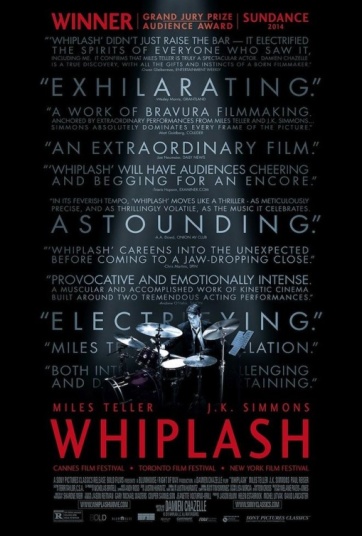Whiplash (Damien Chazelle, 2014)
Whiplash, the overwhelmingly riveting second feature from young (born 1985) writer/director Damien Chazelle (Guy and Madeline on a Park Bench) opens with a scene of an aspiring jazz drummer, Andrew – played with searing commitment by rising star Miles Teller (The Spectacular Now) – rehearsing in an empty studio space. Suddenly, he stops, noticing the eavesdropping (more like lurking) figure of a man outside. He knows who it is, though we don’t, yet. Then that man walks in, and we meet resident musical guru Fletcher – played with powerful intensity by a J.K. Simmons (Spider-Man) as you’ve never seen him before – and the pas-de-deux that will drive the movie for the next 100+ minutes begins.
Fletcher is the most charismatic and demanding teacher at the fictional Shaffer Conservatory of Music in New York, and it’s his role (as he sees it), to create the next generation of geniuses. He sees something in Andrew. Is it genius? Is it hunger? Both? Or is it a willingness to suffer abuse in the pursuit of art? For Fletcher is not a conventional pedagogue. If you want to be great, you must suffer to become so, even if that means having a chair thrown at your head.
Fletcher is clearly a sadist, though he has convinced himself that his methods are the best, and that they are definitely justified by the ends. His students adore him or, at least, believe in his greatness (and fear him). When he tells Andrew, later, that there are no two words more harmful in the English language than “good job,” we know that not only does Fletcher believe this mantra, but so do his (damaged) pupils, Andrew included. Like all successful abusers, Fletcher can also be charming, mixing sugar with his spice, and the kids feed as much on his occasional kindnesses as they do on the nastiness.
It’s an interesting contrast to Andrew’s father, played by a well-cast Paul Reiser (of Mad About You fame), who offers only nurturing support (the mother is long gone). When Andrew eventually breaks down, Dad is there, arms open. But is such unconditional love what Andrew wants or needs?
I loved this film, because it asks us to think about the nature of art, perfectionism, learning and mentorship, and what is acceptable in the pursuit of greatness (or, at least, of mastery). Most of us are (and should be) horrified by Fletcher’s behavior, but there’s something in his desire to accept nothing less than the absolute best that is hard to resist. Wouldn’t we rather listen to a musician who’s been through some kind of crucible of pain and suffering – and survived – than someone who just breezily decided to play one day and has remained forever mediocre? Still, many of us have probably also had mentors who have managed to be demanding without resorting to physical and/or mental assault. It is to Chazelle’s credit that he raises these questions without pushing one specific ideological agenda on us (although the final scene of the movie does skew in favor of triumph over adversity).
The performances are revelatory. Teller and Simmons are quite a pair, and well matched. Teller plays his own drums, for the most part, and we believe his passion. As we believe in the passion of this gifted filmmaker. So go. Give yourself Whiplash and experience perfection through the vicarious suffering of the characters on screen, rather than your own.

